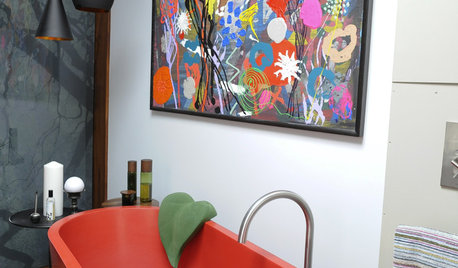A long, hard look at mammograms
Alisande
8 years ago
Featured Answer
Sort by:Oldest
Comments (75)
Texas_Gem
8 years agorob333 (zone 7b)
8 years agoRelated Discussions
Revisions in mammogram guidelines
Comments (32)The panel that made this recommendation was established during the Bush administration. Occasionally some members leave and others join. It has made several recommendations about other types of cancer, and none of those have been controversial, as far as I recall. I don't see this as in any way political and really, really wish that politics would be left out of it. This is not an issue of "bad Bush"/"bad Obama care". I am so offended by the suggestion that it would spare women "anxiety". What do they think we are - delicate flowers that wilt at the first wind or rain? What if they recommended that men should no longer bend over and cough, since men dread that and it hurts. I remember being sky-high with fear and planning my cremation urn while waiting for biopsy results to come in (luckily, benign). Better that than ignoring the lump that I found and being dead three years later. It was indeed reported that there were no oncologists or diagnostic radiologists on this panel....See MoreInteresting new mammogram study
Comments (29)If I'm not mistaken, many women are now being diagnosed with cancer in old age. If every discovered non-benign cell is called Cancer, and all are treated, we can't answer a lot of questions: Are these all life-threatening cancers? Are all fast-growing? Would the person's immune system eliminate some of them? Would the person die of natural causes before the cancer caused serious damage? How much damage is done by the false positives and treatments for the 'positives'? What happened to all the women who did NOT have a cancer discovered (or treated) 'before mammography'? It's an unscientific leap to assume they all died before their time of undiscovered atypical cells in their breasts. I understand the desire to 'get it' before it becomes life limiting, but we don't know which we are seeing or what the outcome would be if it were unseen. Just because we can LOOK! LOOK! shouldn't mean we always need to CUT! CUT! I'm reminded of the adage of not consulting a surgeon if you don't want surgery. It's what they DO! Re: Pap testing. What is the rationale for this test for a woman who is not sexually active or who has only one longtime (trustworthy) partner?...See MoreAbnormal Mammogram (long)
Comments (7)Sending a cyberhug. Hoping for a negative result but should it be worrisome, don't be afraid of sharing with those that care for you. family and friends can really support you through what has to be done. I remember hearing many times over at my father's funeral how disappointed that they were that he couldn't share his illness with them. He had his cancer for ten years. I found out it wasn't benign because as a nurse, I knew what the drugs he was taking were for. Aa hard as it was for my twin to share her aggressive breast cancer with me, I am glad she gave me enough credit for having the maturity to deal with it. I would rather know. (Btw.... Heather is alive and NED ten years later)....See MoreMost painful mammogram ever!
Comments (33)I totally agree that someone should invent something to make mammograms easier and more comfortable. I wish they'd done it years ago, but no one has, as yet. I'm just so glad that you went through with it and had yours done, though, Ded. I was in radiology for 12+ years and I can not count the number of times I did follow-up mamms on women who had put off having them because they pinched or hurt too much. "Follow-ups" because they or their doctor had detected a suspicious lump and they were there finally . . . to rule out cancer. And so many times it was cancer. It broke my heart! Or, I'd be there taking a pre-op chest x-ray on someone before her mastectomy. You can't work in medicine, interacting with people hurting, physically and/or emotionally, and not have it impact you in a huge way. It changes you powerfully! And that's the reason I feel so strongly about not putting off your yearly or every other year mammograms! So, as we like to say in radiology, "Put on your big girl bra and go get that mammogram!"....See Moretibbrix
8 years agoAlisande
8 years agochisue
8 years agoAlisande
8 years agotibbrix
8 years agoElmer J Fudd
8 years agolast modified: 8 years agogyr_falcon
8 years agogyr_falcon
8 years agolast modified: 8 years agorob333 (zone 7b)
8 years agoAlisande
8 years agochisue
8 years agoElmer J Fudd
8 years agogyr_falcon
8 years agogyr_falcon
8 years agoAlisande
8 years agogyr_falcon
8 years agoplllog
8 years agolast modified: 8 years agosjerin
8 years agoElmer J Fudd
8 years agoplllog
8 years agogyr_falcon
8 years agorob333 (zone 7b)
8 years agolast modified: 8 years agoOlychick
8 years agojemdandy
8 years agoOlychick
8 years agolast modified: 8 years agocarol_in_california
8 years agoAlisande
8 years agochisue
8 years agoMDLN
8 years agocarol_in_california
8 years agoAlisande
8 years agoMDLN
8 years agolast modified: 8 years agoAlisande
8 years agoplllog
8 years agoMDLN
8 years agoplllog
8 years agoMDLN
8 years agolast modified: 8 years agoginny20
8 years agorob333 (zone 7b)
8 years agoElmer J Fudd
8 years agorob333 (zone 7b)
8 years agoElmer J Fudd
8 years agolast modified: 8 years ago
Related Stories

HOUZZ TOURSMy Houzz: Hard Work Pays Off in a DIY Cottage Renovation
First-time homeowners roll up their sleeves and give their midcentury Montreal home an infusion of style and personality
Full Story
LIFEHard Winter? 9 Ways to Battle Cabin Fever
We know a lot of you are trapped where it just won’t stop snowing. Here are some ways to survive
Full Story
REMODELING GUIDES9 Hard Questions to Ask When Shopping for Stone
Learn all about stone sizes, cracks, color issues and more so problems don't chip away at your design happiness later
Full Story
TRANSITIONAL HOMESHouzz Tour: Would-Be House Flipper Falls Hard for a Florida Bungalow
An investment project winds up becoming home for a St. Petersburg, Florida, design enthusiast
Full Story
LANDSCAPE DESIGNHow to Choose a Fence That Feels Right and Works Hard
Making a thoughtful fencing choice now can create happiness for years to come
Full Story
MATERIALSA Hard Look at Recycled Plastic for the Home
It's durable and versatile, but processing takes a lot of energy. We sort through the facts on recycled plastic so you can choose wisely
Full Story
KITCHEN ISLANDSWhat to Consider With an Extra-Long Kitchen Island
More prep, seating and storage space? Check. But you’ll need to factor in traffic flow, seams and more when designing a long island
Full Story
INSIDE HOUZZHow Much Does a Remodel Cost, and How Long Does It Take?
The 2016 Houzz & Home survey asked 120,000 Houzzers about their renovation projects. Here’s what they said
Full Story
BOOKSBook to Know: 'Long Island Modernism 1930-1980'
Photographs mix with social history from the architectural highlights of Long Island's suburbanization
Full Story





marylmi